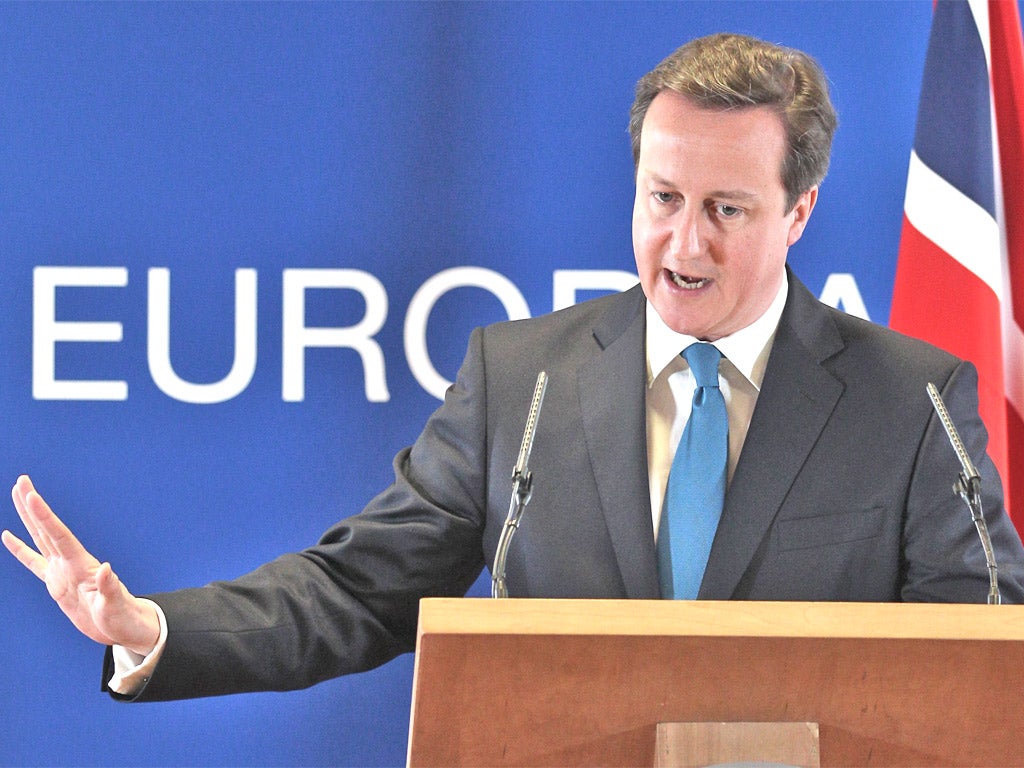PM: I'll veto any move that undermines single market
Cameron tells MPs he would demand 'proper safeguards' before any changes to the EU

Your support helps us to tell the story
From reproductive rights to climate change to Big Tech, The Independent is on the ground when the story is developing. Whether it's investigating the financials of Elon Musk's pro-Trump PAC or producing our latest documentary, 'The A Word', which shines a light on the American women fighting for reproductive rights, we know how important it is to parse out the facts from the messaging.
At such a critical moment in US history, we need reporters on the ground. Your donation allows us to keep sending journalists to speak to both sides of the story.
The Independent is trusted by Americans across the entire political spectrum. And unlike many other quality news outlets, we choose not to lock Americans out of our reporting and analysis with paywalls. We believe quality journalism should be available to everyone, paid for by those who can afford it.
Your support makes all the difference.David Cameron has threatened to veto any moves by the eurozone countries to bring in changes to the European Union that would undermine the single market.
The Prime Minister, who angered Britain's EU partners by vetoing a fiscal union treaty last December, told MPs he would repeat his demand for "proper safeguards" to protect the City of London, Bank of England and single market as eurozone nations forge a banking, fiscal and political union.
He told the Commons Liaison Committee of select committee chairmen that banking union inside the eurozone would not necessarily mean "fundamental change" for Britain. But he admitted there was a "worry" that the 17 countries inside the euro would act as a "caucus" against those on the outside.
Urging Conservative MPs demanding an immediate referendum on Europe to show patience, Mr Cameron said he wanted to see a "better balance of powers between Britain and Europe, because I would like to see some powers returned". He cited employment legislation and Home Office laws.
But, he said, eurozone nations were too busy "firefighting" the crisis facing their economies to consider British demands at the moment. "It is never going to be easy," he conceded.
The Prime Minister said: "Clearly what is going to happen is if the eurozone is going to survive it will have to make moves towards a more integrated state. We won't be part of that."
He added: "I think we are only at the beginning of those conversations... There's a lot of work to be done, there's a lot of thinking to be done and a lot of conversations to be had."
The Tories' stance on Europe came under fire yesterday from José Manuel Barroso, the president of the European Commission, who accused them of saying one thing in London and another in the European Parliament – something Mr Cameron vowed never to do.
Mr Barroso angered Tory MEPs by accusing them of taking pleasure from the eurozone crisis.
He told the European Parliament in Strasbourg: "It is puzzling that you seem to delight in the difficulties of the euro area. This is in stark contrast with the position taken by your leader, Prime Minister Cameron. So, a good effort would be, in terms of accountability to your public, to say the same thing here that you say in London."
Insisting that there was an EU-wide consensus, including the British Government, to strengthen the eurozone, Mr Barroso told the Tory representatives: "I am also, by the way, very puzzled with the ease with which some of you are recommending some member states to leave the euro.
"This once again is in complete contrast with the positions taken by the Prime Minister of Britain."
Martin Callanan, leader of the Tory MEPs, accused Mr Barroso of trying to find "a scapegoat for the EU's categorical failure to get to grips with the euro crisis" and told him he was "becoming worried for your blood pressure".
In a letter to the European Commission chief, Mr Callanan denied taking "delight" at the eurozone crisis and demanded an apology for his "outburst".
He said: "I take absolutely no pleasure in the substantial loss of national democracy being forced upon eurozone countries."
Join our commenting forum
Join thought-provoking conversations, follow other Independent readers and see their replies
Comments